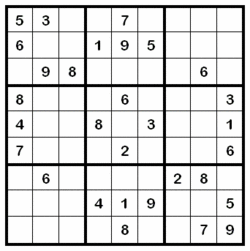Sudoku Explained
Sudoku (Japanese: 数独,, sūdoku), sometimes spelled Su Doku, is a placement puzzle, also known as Number Place in the United States. The aim of the puzzle is to enter a number from 1 through 9 in each cell of a grid, most frequently a 9×9 grid made up of 3×3 subgrids (called "regions"), starting with various numbers given in some cells (the "givens"). Each row, column and region must contain only one instance of each number. Completing the puzzle requires patience and modest logical ability (although some puzzles can be very difficult). Its classic grid layout is reminiscent of other newspaper puzzles like crosswords and chess problems. First published in the United States, Sudoku initially became popular in Japan in 1986 and attained international popularity in 2005.
The word Sudoku means "single number" in Japanese. The numerals in Sudoku puzzles are used for convenience; arithmetic relationships between numerals are not important. Any set of distinct symbols will do; letters, shapes, or colours may be used without altering the rules. Indeed, Penny Press uses letters in their version called Scramblets. Dell Magazines, the puzzle's originator, has been using numerals for Number Place in its magazines since they first published it over 25 years ago. Numerals are used throughout this article.
The attraction of the puzzle is that the completion rules are simple, yet the line of reasoning required to reach the completion may be difficult. Published puzzles often are ranked in terms of difficulty. This also may be expressed by giving an estimated solution time. While, generally speaking, the greater the number of givens, the easier the solution, the opposite is not necessarily true. The true difficulty of the puzzle depends upon how easy it is to logically determine subsequent numbers.
Sudoku is recommended by some teachers as an exercise in logical reasoning. The level of difficulty of the puzzles can be selected to suit the audience. The puzzles are often available free from published sources and also may be custom-generated using software.
Wikipedia, the free encyclopedia.
- Login to post comments







Slowing the progression of Alzheimer?
Conceptis Ltd. has shared an interesting article.
"At the end of 2004 Wayne Gould, a retired Hong Kong judge as well as a puzzle fan and a computer programmer, visited London trying to convince the editors of The Times to publish Sudoku puzzles. Gould, that had written a computer program which generates Sudoku puzzles of different difficulty levels, demanded no money for the puzzles. The Times decided to give it a try and on November 12, 2004 launched their first Sudoku puzzle.
The publishing of Sudoku in the London Times was just the beginning of an enormous phenomenon which swiftly spread all over Britain and its affiliate countries of Australia and New Zealand. Three days later The Daily Mail began publishing Sudoku puzzles titled as "Codenumber". The Daily Telegraph of Sydney followed on 20 May 2005. By the end of May 2005 the puzzle was regularly published in many national newspapers in the UK, including The Daily Telegraph, The Independent, The Guardian, The Sun and The Daily Mirror.
But that was not it. In July 2005 Channel 4 included a daily Sudoku game in their Teletext service and Sky One launched the world's largest Sudoku puzzle - a 275 foot (84 meter) square puzzle, carved in the side of a hill in Chipping Sodbury, near Bristol. The BBC Radio 4's Today began reading numbers aloud in the first Sudoku radio version. Famous British celebrities as Big Brother's Jade Goody and Carol Vorderman, that her book How to do Sudoku is the best-selling book in the country, have testified to its benefits as a mental workout. Even the Teachers magazine which is backed by the government recommended Sudoku as brain exercise in classrooms and suggestions have been made that Sudoku solving is capable of slowing the progression of brain disorder conditions such as Alzheimer's."
Is it true all about the SuDoku benefits as a mental workout? I don't know but anyway SuDuku is quite a huge benefit for our brains.
... Let's SuDoku!